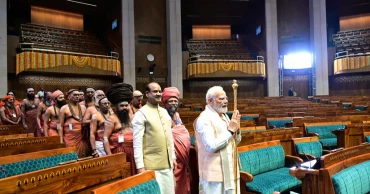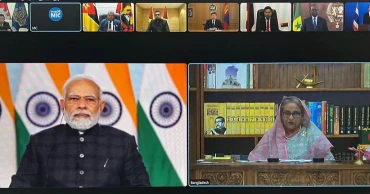Modi
Modi talks to Tarique over phone, reaffirms India's support
Indian Prime Minister Narendra Modi spoke with BNP Chairman Tarique Rahman on Friday and extended support in his endeavour to fulfill the aspirations of the people of Bangladesh.
"Delighted to speak with Mr. Tarique Rahman. I congratulated him on the remarkable victory in the Bangladesh elections," PM Modi said.
He conveyed his best wishes and support in his endeavour to fulfill the aspirations of the people of Bangladesh.
Modi congratulates Tarique Rahman on BNP’s decisive poll victory
"As two close neighbours with deep-rooted historical and cultural ties, I reaffirmed India’s continued commitment to the peace, progress, and prosperity of both our peoples," said the Indian Prime Minister.
18 days ago
Modi congratulates Tarique Rahman on BNP’s decisive poll victory
Indian Prime Minister Narendra Modi on Friday conveyed his warm congratulations to Tarique Rahman on leading BNP to a decisive victory in the Parliamentary elections in Bangladesh.
“This victory shows the trust of the people of Bangladesh in your leadership,” Modi said in a message.
India will continue to stand in support of a democratic, progressive and inclusive Bangladesh, he said.
"I look forward to working with you to strengthen our multifaceted relations and advance our common development goals," he added.
Voting in Bangladesh’s national election concluded on Thursday in a largely peaceful atmosphere, with high hopes of restoring genuine democracy and securing a strong mandate for national reforms.
The polling in Bangladesh began at 7:30am and continued until 4:30pm without interruption at 42,659 polling stations in 299 out of 300 constituencies, amid the deployment of nearly one million security personnel and another one million polling staff.
18 days ago
Spirit of mutual respect, understanding to guide 2 nations to work together: Prof Yunus to PM Modi
Chief Adviser Professor Muhammad Yunus and Indian Prime Minister Narendra Modi have exchanged Eid-ul-Azha greetings in the spirit of festivity, sacrifice, generosity and unity.
"I am confident that the spirit of mutual respect and understanding will continue to guide our nations to work together for the wellbeing of our peoples," Prof Yunus wrote to PM Modi on June 6.
The interim government on Sunday shared both the letters through its verified social media handle.
He said Eid-ul-Azha is a time of reflection, which brings communities together in the spirit of festivity, sacrifice, generosity and unity and inspires them all to work together for the greater benefits of the peoples across the world.
India for 'inclusive, fair, free' polls in Bangladesh at an early date
Prof Yunus said he deeply appreciates PM Modi's thoughtful message, kind greetings and warm wishes on the occasion of Eid-ul-Azha, which reflects the shared values between the two countries.
"I also would like to convey my warmest greetings to you, and through you, to the people of India on this auspicious occasion," the message from Prof Yunus reads.
On this blessed occasion, Prof Yunus wished PM Modi good health and happiness and the people of India peace, progress, and prosperity.
Indian president hopes for ‘democratic, inclusive’ Bangladesh as Dhaka’s envoy presents credentials
Earlier, on behalf of the people and the Government of India, PM Modi on June 4 conveyed warm greetings to Prof Yunus and the people of Bangladesh on the auspicious occasion of Eid al-Adha.
This holy festival is an integral part of the rich and diverse cultural heritage of India and is celebrated with immense joy and fervour by millions of people of Islamic faith across the country, Modi said.
"It reminds us of the timeless values of sacrifice, compassion and brotherhood, which are essential in building a peaceful and inclusive world," PM Modi mentioned.
"I take this opportunity to extend my best wishes for your good health and well-being," the message from Modi reads.
8 months ago
New Year: Indian PM Modi greets CA Dr Yunus
Indian Prime Minister Narendra Modi has greeted Chief Adviser Professor Muhammad Yunus on the ocassion of New Year-2025.
"Best wishes for the New Year," Prime Minister Modi wrote to Prof Yunus.
Chief Adviser's Deputy Press Secretary Abul Kalam Azad Majumder confirmed it on Monday, noting that it came through diplomatic channel.
1 year ago
PM Hasina writes to Modi hailing India’s historic landing on Moon
Prime Minister Sheikh Hasina sent a message to her Indian counterpart Narendra Modi congratulating him and the people of India on the successful lunar landing of Chandrayaan-3.
In her message to Prime Minister Modi on August 23, she conveyed her felicitations to the Indian Space Research Organization (ISRO) and its scientists for making India the fourth nation globally to land a spacecraft on the moon's surface.
Read: Hasina-Xi meeting underway in Johannesburg
Hasina also conveyed that Bangladesh rejoices with India on this momentous occasion and on this historic achievement, which is a matter of immense pride and inspiration to all the South Asian countries in advancing the science and space technology sector.
India has made history as its Moon mission becomes the first to land in the lunar south pole region.
Read: Possibility of courtesy meeting between Hasina and Modi on the sidelines of BRICS Summit: Foreign Ministry
With this, India joins an elite club of countries to achieve a soft landing on the Moon, after the US, the former Soviet Union and China.
The Vikram lander from Chandrayaan-3 successfully touched down as planned at 18:04 local time (12:34 GMT).
2 years ago
BRICS Summit: Hasina, Modi likely to hold meeting on the sidelines
Prime Minister Sheikh Hasina and her Indian counterpart Narendra Modi are likely to hold a meeting in Johannesburg, South Africa, on the sidelines of the BRICS Summit. Both South Asian leaders are traveling to the African country this week.
They will be visiting Johannesburg, South Africa from August 22 to 24 to attend the 15th BRICS Summit at the invitation of Matamela Cyril Ramaphosa, President of the Republic of South Africa.
During his visit, Indian Prime Minister Modi will hold bilateral meetings with some of the leaders present in Johannesburg, said the Indian Ministry of External Affairs without mentioning names.
Bangladesh's inclusion in BRICS depends on members: Foreign Minister
Prime Minister Hasina will also attend the G20 Summit in India in September.
The 18th G20 Heads of State and Government Summit in New Delhi on September 9-10 will be a culmination of all the G20 processes and meetings held throughout the year among ministers, senior officials, and civil societies.
A G20 Leaders’ Declaration will be adopted at the conclusion of the New Delhi Summit, stating leaders’ commitment towards the priorities discussed and agreed upon during the respective ministerial and working group meetings.
BRICS Summit 2023 unveils potential geopolitical paradigm shift: Modern Diplomacy
Talking to reporters, Foreign Minister Dr AK Abdul Momen had earlier said that New Delhi will be better than Johannesburg for a bilateral meeting with Indian PM Modi. The two countries are already in touch regarding the meeting.
Momen also said that Africa is a “rising star”, and Bangladesh wants to make stronger connections with countries in the continent.
“Our relations with African countries are not that strong. We have opened two missions there. The prime minister will give them instructions (to make greater efforts),” he remarked.
This will be the first in-person BRICS Summit since 2019. The Summit will provide an opportunity to review progress of the initiatives launched by the grouping, and identify future areas of activity.
2023 BRICS Summit: Lot of interest in how new members are chosen and which countries would be eligible
Prime Minister Modi will also participate in a special event “BRICS – Africa Outreach and BRICS Plus Dialogue” being organised after the BRICS Summit, which will include other countries invited by South Africa.
2 years ago
“There are people in India who think they know more than God and PM Modi is "one such specimen," says Rahul during US tour
Congress leader Rahul Gandhi, now on a six-day tour in the United States, criticized Prime Minister Narendra Modi and the ruling Bharatiya Janata Party (BJP) saying there are people in India who think they know more than God and PM Modi is "one such specimen."Speaking at an event in San Francisco organised by the Indian Overseas Congress USA, he took a dig at PM Modi, suggesting that Modi "would start explaining to God how the universe works” as “Some people believe they know everything,” insinuating that the Premier falls into this category, reports NDTV.Union Minister Anurag Thakur swiftly responded to Gandhi's comments, accusing the Congress leader of being unable to accept the praise and appreciation PM Modi received during his recent foreign visits. Thakur claimed that Gandhi's remarks were an attempt to undermine India's progress on the international stage.During his first speech on his three-city visit, Rahul Gandhi shed light on the launch of the 'Bharat Jodo Yatra'. “Some months ago, we started a walk from Kanyakumari to Kashmir. While walking we realised that normal instruments for doing politics (connecting with people) were not working anymore. They were controlled by the BJP and RSS. People are threatened and agencies are used against them. In some way, it had become quite difficult to act politically. That is why we decided to walk from the southernmost tip of India to Srinagar," the Congress leader said at an event titled 'Mohabbat ki Dukaan' on Wednesday.In an apparent jab at PM Modi, Rahul Gandhi remarked, “Some groups in India are under the impression that they know everything. In India, we grew up with people of different languages, different religions. And that is what is being attacked. The tradition in India, of people like Gandhi Ji and Guru Nanak Ji, has been that you should not be under the impression of knowing everything. It is a 'disease' that some groups of India think that they know everything. Even if they have a conversation with God, they might explain to him.”"And of course, the Prime Minister is one of them. If you make him sit with God, he would start explaining to him (God) how the universe works...and God would get confused about what I had created. They (BJP) can speak to scientists and explain science to them. They can explain history to historians, warfare to the army and flying to the air force. But at the heart of it, they don't know anything,” he added. The ruling BJP responded strongly to Gandhi's remarks. Union Minister Anurag Thakur accused the Congress leader of insulting India while on his visits abroad.“During his foreign visits, Rahul Gandhi insults India, which is unacceptable. He wants to insult PM Modi but ends up insulting India, questioning India's progress. He is trying to tarnish India at a time the world is acknowledging our growing stature," he said.“PM Modi met almost 24 PMs and Presidents of the world and held over 50 meetings during his foreign visit recently. Several world leaders say Modi is the most popular leader. When the Australian PM said 'PM Modi is the Boss', Rahul Gandhi could not digest this,” added the Union Minister.
2 years ago
Modi opponents boycott opening of new parliament building as PM reshapes India’s power corridor
India's major opposition parties Sunday boycotted the inauguration of a new parliament building by Prime Minister Narendra Modi in a rare show of unity against his Hindu nationalist ruling party, which has spent nine years in power and is seeking a third term in general elections next year.
Modi inaugurated the new parliament in the capital of New Delhi by offering prayers as Hindu priests chanted religious hymns at the start of the ceremony. Opposition parties criticized the event saying the prime minister had sidelined President Droupadi Murmu, who has only ceremonial powers but is the head of state and highest constitutional authority.
"May this iconic building be a cradle of empowerment, igniting dreams and nurturing them into reality," Modi tweeted shortly after the inauguration.
Senior ministers from Modi's party and leaders from its alliance partners attended the inauguration but at least 19 opposition parties skipped the event, which coincided with the birth anniversary of a Hindu nationalism ideologue.
Opposition parties said in a statement Wednesday that Modi's "decision to inaugurate the building by himself" was "a grave insult" to India's democracy, adding that the ruling government had "disqualified, suspended and muted" opposition lawmakers while passing "controversial legislation" with little debate.
"When the soul of democracy has been sucked out from the parliament, we find no value in a new building," the parties said.
India's powerful Home Minister Amit Shah said the opposition had politicized the event and other leaders from Modi's party said the boycott is "an insult to the prime minister."
The new triangular-shaped building — built at an estimated cost of $120 million — is part of a $2.8 billion revamp of British-era offices and residences in central New Delhi that will also include blocks of buildings to house government ministries and departments, and Modi's new private residence. The entire project, called the "Central Vista," is spread over 3.2 kilometers (1.9 miles).
The project was announced in 2019 and Modi laid its foundation a year later in December 2020.
The plan has drawn intense criticism from opposition politicians, architects and heritage experts, many of whom have called it environmentally irresponsible, a threat to cultural heritage and too expensive.
Outrage grew in 2021 when at least 12 opposition parties questioned the project's timing, saying it was built as the country faced a devastating surge in coronavirus cases. They branded the revamp as Modi's "vanity project" and said its construction was prioritized over the loss of lives and livelihoods during the pandemic.
A year earlier, a group of 60 former civil servants wrote an open letter to Modi to highlight the architectural value of the old parliament building and said the new plan would "irrevocably" destroy the area's cultural heritage.
Modi's government has said the revamp was necessary because the older building was "showing signs of distress and over utilization" and that the new design "combines the country's heritage and traditions."
The newly inaugurated building sits just across from India's old parliament, a circular structure designed by British architects in the early 20th century. The new four-story building has a total of 1,272 seats in two chambers, almost 500 more than the old building.
The old parliament will be converted into a museum.
During the televised ceremony Sunday, Modi prostrated before a royal golden scepter that his Bharatiya Janata Party says symbolized the transfer of power when it was gifted to the country's first prime minister on the eve of India's independence from Britain in 1947. Dozens of Hindu priests followed Modi inside the parliament, where he installed the scepter near the chair of the speaker.
Modi's critics and opposition leaders have questioned the scepter's historicity and said the emblem is appropriate to a monarchy, not a democracy.
The prime minister's supporters see the new parliament as his attempt to remake India's power corridor and disrupt the country's colonial legacy.
Last year, Modi inaugurated a revamped colonial avenue in the heart of New Delhi that is used for ceremonial military parades. The boulevard was earlier called "Rajpath," or Kingsway, but Modi's party changed it to "Kartavya Path," or road to duty, arguing the old name was a "symbol of slavery" that had "been erased forever."
Many such moves by Modi's ruling government have been met with strong criticism, but the controversy over the new parliament building has been the most fractious.
It comes just months after opposition leaders protested Congress leader Rahul Gandhi's disqualification from Parliament in a defamation case over remarks he made about Modi's surname.
Hours before the new parliament was opened, the Congress party's general secretary, Jairam Ramesh, criticized Modi again.
"A self-glorifying authoritarian Prime Minister with utter disdain for Parliamentary procedures, who rarely attends Parliament or engages in it, inaugurates the New Parliament building in 2023," he tweeted.
Barely a mile away from the ceremony, a heavy police presence overpowered about 100 protesting Indian wrestlers and their supporters, who have accused their federation president of sexual harassment and had planned to march to the new parliament building. Some of the protesters scuffled with police and were taken away in a bus.
The protesters have been staging demonstrations in New Delhi for nearly a month demanding the resignation and arrest of Wrestling Federation of India President Brij Bhushan Sharan Singh for allegedly sexually harassing young athletes.
Singh, who has denied the accusations, is a powerful lawmaker from Modi's party.
2 years ago
Australia rules out Quad summit going ahead in Sydney without Biden, but Modi still plans visit
Australian Prime Minister Anthony Albanese has ruled out a so-called Quad summit taking place in Sydney without President Joe Biden, saying the four leaders will talk at the Group of Seven meeting this weekend in Japan.
Albanese said Wednesday he understands why Biden pulled out of the summit to focus on debt limit talks in Washington since they are crucial to the economy. The summit including Indian Prime Minister Narendra Modi and Japanese Prime Minister Fumio Kishida had been scheduled for May 24.
“The blocking and the disruption that’s occurring in domestic politics in the United States, with the debt ceiling issue, means that, because that has to be solved prior to 1st June — otherwise there are quite drastic consequences for the U.S. economy, which will flow on to the global economy — he understandably has had to make that decision,” Albanese told reporters.
Biden “expressed very much his disappointment” at being unable to come to the Sydney summit and to the national capital Canberra a day earlier to address Parliament, Albanese said.
The four leaders will soon be together in Hiroshima, Japan, for the Group of Seven summit and are planning to meet there, he said.
Also Read: Quad voices deep concern at "deteriorating situation" in Myanmar
“The Quad is an important body and we want to make sure that it occurs at leadership level and we’ll be having that discussion over the weekend," Albanese said.
He said Modi will visit Sydney next week, noting the Indian leader was scheduled to give an address to the Indian diaspora at a sold-out 20,000-seat stadium on Tuesday. But Kishida will not visit.
Also Read: Quad FMs, wary of China’s might, push Indo-Pacific option
“Prime Minister Modi will be here next week for a bilateral meeting with myself. He will also have business meetings, he’ll hold a very public event ... in Sydney,” Albanese told Australian Broadcasting Corp.
“I look forward to welcoming him to Sydney,” Albanese said. “Prime Minister Kishida of Japan was just coming for the Quad meeting. There wasn’t a separate bilateral program.”
Also Read: Beijing wants Dhaka not to join Quad
Albanese said it was “disappointing” that Biden decided he could not come.
“The decision of President Biden meant that you can’t have a Quad leaders’ meeting when there are only three out of the four there,” Albanese said.
2 years ago
Modi calls on leaders of Global South to unitedly forge a common agenda for its own development
At the Voice of the Glocal South Summit hosted virtually by India on Thursday, Prime Minister of India, Narendra Modi called on leaders of the Global South to unitedly forge a common agenda for its own development and for the three-fourth of humanity that lives in it.
Bangladesh, represented by Prime Minister Sheikh Hasina, was invited to the inaugural session where world leaders shared their country’s views.
She thanked the Indian government for inviting Bangladesh to this important summit that would provide it a unique opportunity to engage with counterparts world over.
Read more: Modi rolls out 5G mobile internet services in India
PM Hasina warmly congratulated Indian Prime Minister Narendra Modi and the government of India on assumption of G20 Presidency and added that Bangladesh welcomes India's vision as the President of G20 to ensure inclusive development under the theme, "One Earth, One Family, One Future".
PM Modi spoke of the Global South as a united entity with the greatest stakes in the future and added that India has always stood for the greater role of developing countries in determining our common future.
To reshape the global emerging order, he called for an equivalent voice of the Global South.
To redesign global political and financial governance, remove inequities, enlarge opportunities, support growth and spread progress and prosperity, he called for simple, scalable and sustainable solutions to transform the Global South and proposed a 4R strategy - ‘Respond, Recognize, Respect and Reform’: Respond to the priorities of the Global South by framing an inclusive and balanced international agenda; Recognize that the principle of ‘Common but Differentiated Responsibilities’ applies to all global challenges; Respect sovereignty of all nations, rule of law and peaceful resolution of differences and disputes; and Reform international institutions, including the United Nations, to make them more relevant.
Human-centric development came out as an-important important priority from all the world leaders.
Read more: India’s G20 agenda to be inclusive, ambitious, action-oriented, decisive: Modi
3 years ago



















